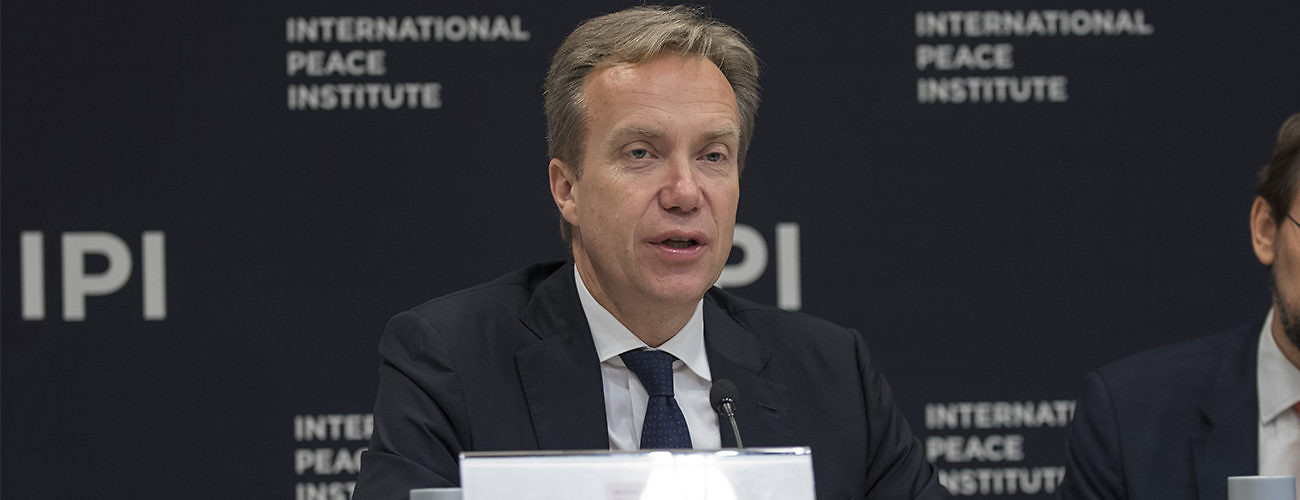Speaking at the 10th annual Trygve Lie Symposium on Fundamental Freedoms at IPI, Norwegian Foreign Minister Børge Brende said that religious minorities are the “most vulnerable people in the world” and that it was impossible to “separate freedom of religion from other civil rights like the rights to privacy and assembly and expression.”
The title of this year’s symposium, co-sponsored by IPI and the Norwegian Ministry of Foreign Affairs and held on September 21, 2017, was “Promoting the Freedom of Religion or Belief,” and Mr. Brende noted that “collective religious hatred is not a natural phenomenon, it is man made.” Therefore, he argued, we have the power to end it, and “it is our moral obligation to work for a solution.”
Pointing out how widespread religious persecution is, IPI President Terje Rød-Larsen opened the meeting by noting that three quarters of the world’s population “still live in countries with high restrictions when it comes to freedom of religion or belief.”
Zeid bin Ra’ad Al-Hussein, the United Nations High Commissioner for Human Rights, said that religious systems have been “among the roots of human rights law and International Humanitarian Law” and that he was convinced that “religious leaders with their considerable influence over the minds of millions can be consequential human rights actors in the world today.”
He added that religious minorities must be “free to fully participate in all areas of society, though it must be clear that they cannot impose their beliefs on others.”
Retno Marsudi, the Minister of Foreign Affairs of Indonesia, noted that her country, the world’s largest Muslim nation, also was home to Christians, Hindus, Buddhists, Confucianists and many other faiths. “Freedom of religion is in the DNA of Indonesia,” she said. “Tolerance is what holds us together as a nation.”
In a reference to the dangers of both Islamic fundamentalism and Islamophobia, she said, “Religious extremism has falsely used religion to justify their inhuman policies and they abuse the guarantee of freedom of expression promised by democracy.”
Lord Ahmad of Wimbledon, the British Minister of State for the Commonwealth and the UN, said the key to tackling extremism was resisting intolerance. “You must be intolerant of intolerance,” he said. “If we nip it in the bud, that intolerance will not rear its ugly head as discrimination, and that will not turn into persecution, and persecution will not turn into human suffering.”
Mark Lattimer, Executive Director of Minority Rights Group International, warned against treating religious identity as something separate from a human right.
“When we speak about freedom of religion and belief, it is not just about freedom to worship,” he said. “Those are vital rights, but if you look at the face of religious rights, what you see is targeted persecution based on religious identity.”
He said that “the individual right to freedom of religion and belief, the collective persecution on account of identity, the mobilization of communities for political purposes all are different phenomena with different solutions, and we need to be careful about abandoning human rights solutions in favor of others.”
Ulrik Vestergaard Knudsen, Denmark’s Permanent Secretary of State for Foreign Affairs, reported that his government raised the issue of religious freedom in international meetings “as much as possible” and at home was about to create the new post of ambassador for religious minorities.
Norwegian parliamentarian Abid Raja said that the three-year-old International Panel of Parliamentarians for Freedom of Religion or Belief, of which he is a member, now had representatives in more than 65 countries and was growing.
Several speakers referred to persisting instances of religious persecution, particularly the forced expulsion of the Rohingya Muslim minority from Myanmar. In his comment, Mr. Borge said, “The fact that we are using the words ‘genocide’ and “ethnic cleansing’ to describe events unfolding in 2017, 70 years after the adoption of the Universal Declaration of Human Rights, is a disgrace.”
IPI President Terje Rød-Larsen moderated the discussion.








